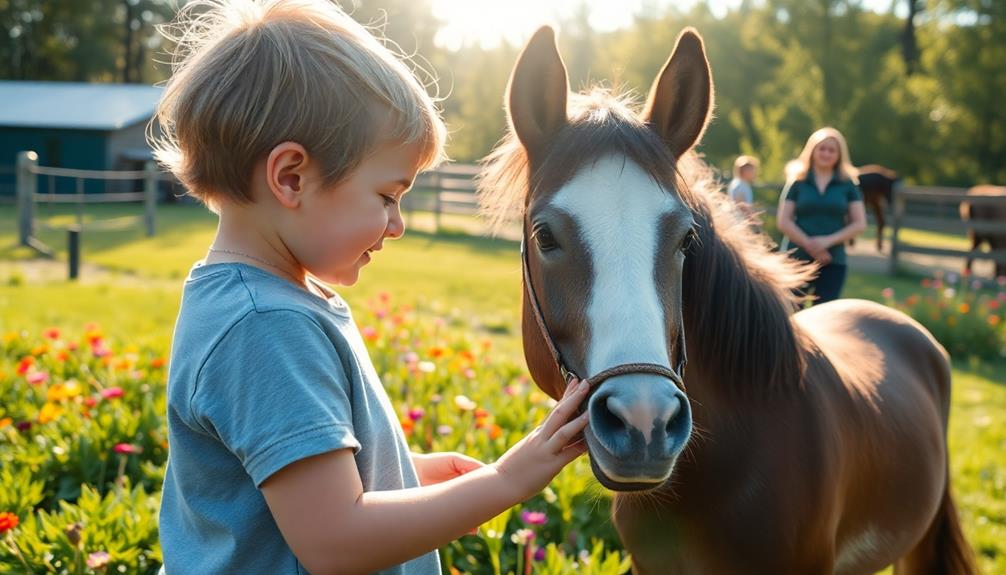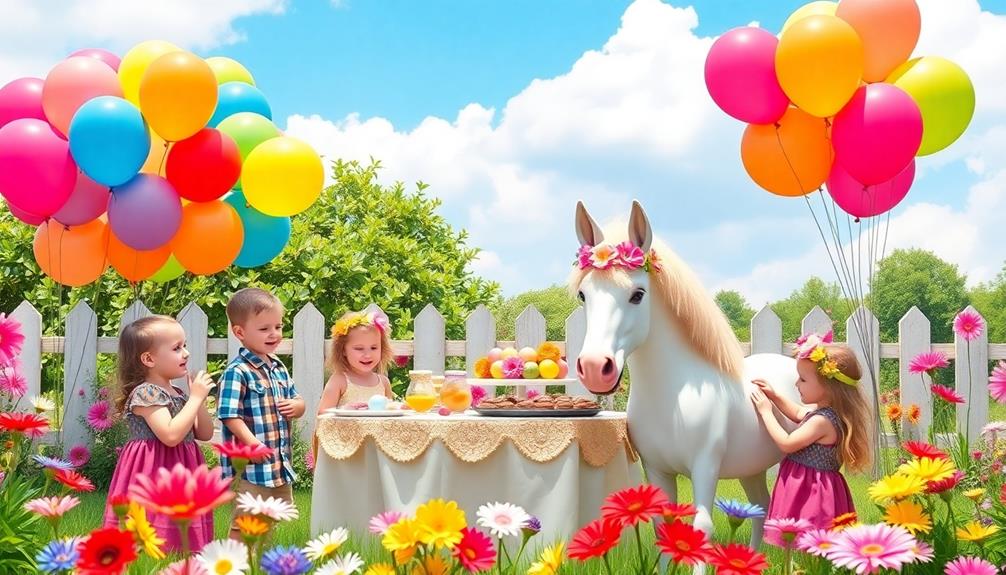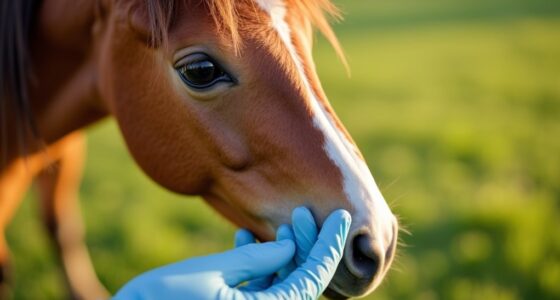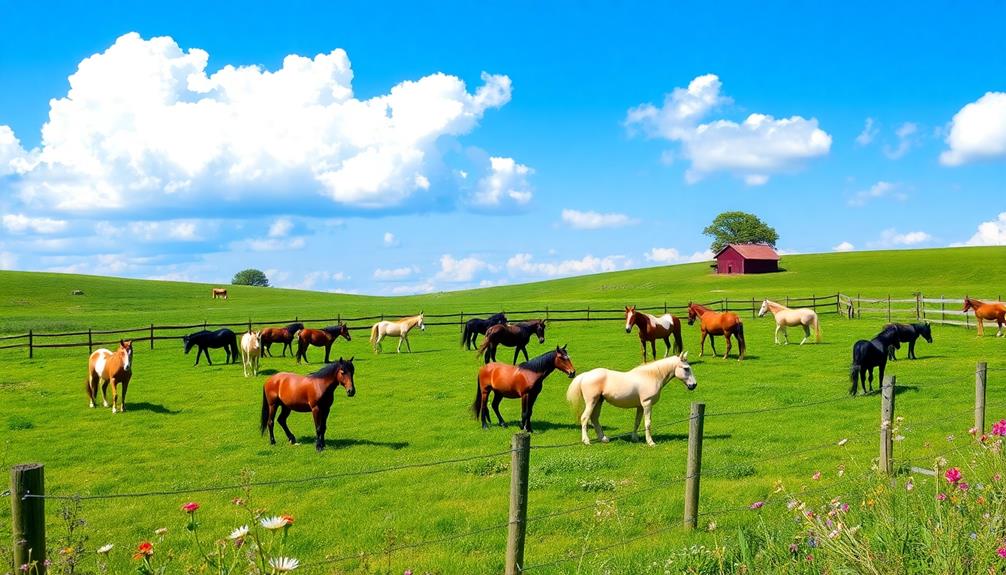When you rescue a miniature horse, you're not just saving a life—you're transforming your own. Each mini has its backstory, often filled with challenges and trauma. By offering a safe environment, you help them heal, just like Marshmallow, who blossomed in a loving foster home. Building trust takes time, but the rewards are immense. You'll create lasting bonds and experience joy as you watch them thrive. The adoption journey is essential, providing support and guidance. If you're curious about how to get started, you'll find useful insights that inspire action and compassion in your heart.
Key Takeaways
- Rescuing miniature horses transforms their lives, providing rehabilitation and a loving home after trauma and neglect.
- Successful adoption processes include assessing temperament, background, and ensuring proper care to foster trust and companionship.
- Community involvement and support are essential for rescue organizations to thrive and provide ongoing care for rescued minis.
- Each rescued mini has a unique story, showcasing their potential for transformation and the joy they bring to adoptive families.
- By adopting a mini, you not only save a life but also gain a loyal companion who can enrich your life.
The Journey to Miniature Horse Rescue

The journey to miniature horse rescue often starts with a simple love for horses, but for one individual, it transformed into a lifelong commitment after a life-altering auto accident in 1999. This pivotal moment shifted their focus from larger breeds to miniature horses, igniting a passion that would shape their future.
In 2004, they joined the Blue Water Miniature Horse Club (BWMHC), taking on roles like newsletter editor and treasurer, which deepened their engagement with the community.
By 2011, their dedication evolved further as they resigned from BWMHC to concentrate on personal rescue efforts. This decision led to the founding of Saved Grace Miniature Horse Rescue in 2014, a milestone that underscored their unwavering commitment to horse rescue.
Their involvement with Chances Miniature Horse Rescue (CMHR) starting in 2009 solidified this mission, where they served as a director and treasurer, fostering rescued horses and advocating for their care.
To guarantee the success of miniature horse rescue initiatives, they embraced social media and community outreach, emphasizing the crucial role of public support, donations, and volunteer opportunities. Your engagement can make a difference in the lives of these precious animals.
Success Stories of Rescued Minis
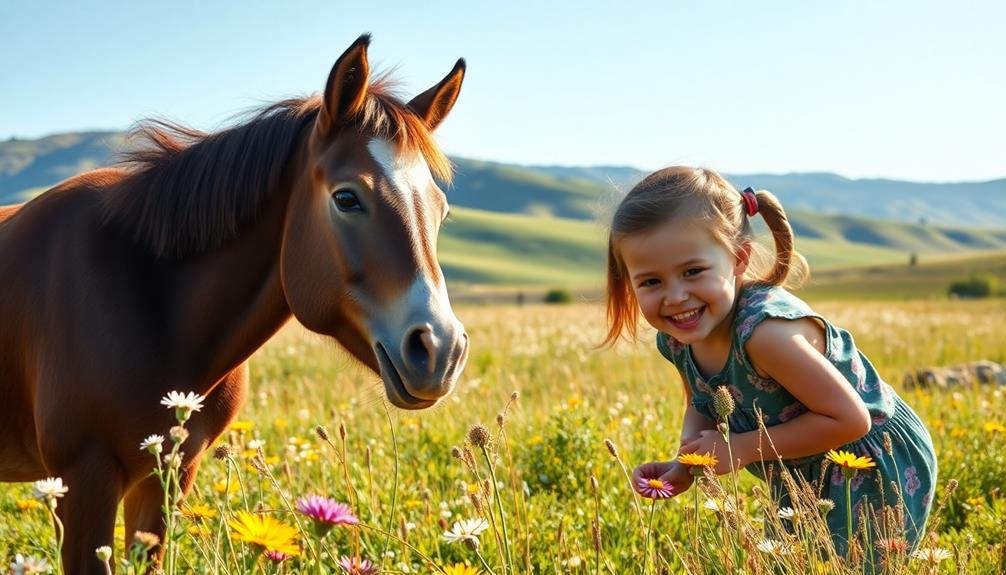
Rescue efforts for miniature horses create remarkable transformations, showcasing the resilience of these animals and the dedication of their caretakers. Each of the success stories highlights how love and care can turn the lives of these minis around.
Take Stanley, for instance. Once deemed untrainable and traumatized, he spent nine months undergoing rehabilitation before successfully integrating into a herd and finding a peaceful retirement home.
Then there's Velvet, a former World Champion at 25, who discovered new companionship with Fred, another mini, leading to a fulfilling life in a loving environment.
Marshmallow, now renamed Sundae, shifted from multiple owners to a dedicated foster home where she lost weight and gained confidence.
Molly, initially wild and neglected, transformed into a well-behaved companion and was adopted for therapy training, proving that recovery and trust-building are possible.
These success stories underscore the importance of rehabilitation, showing that every mini considered a rescue can find their forever home.
Through the commitment of their caretakers, these horses not only survive but thrive, changing lives in the process—both theirs and yours.
Challenges in Miniature Horse Rescue

When you step into the world of miniature horse rescue, you'll quickly realize the deep-seated challenges these vulnerable animals face. Rescued minis often come with a history of trauma, leading to fear or distrust of humans. This requires you to approach them with patience and understanding during their rehabilitation.
Evaluating their health and behavior at kill shelters can also be tricky, as their backgrounds may remain unknown.
Here are some specific challenges you might encounter:
- Building trust takes time and consistent handling.
- Group dynamics can hinder individual bonding, making one-on-one attention essential.
- Post-purchase adjustments may lead to behavioral difficulties for minis.
- Ethical dilemmas arise about whether rescuing from kill shelters truly helps save them in the long run.
These challenges highlight the importance of being prepared and committed to helping these miniature horses thrive.
The journey may be tough, but the reward of seeing a once-timid mini blossom into a loving companion makes it all worthwhile. Embracing these challenges is key to ensuring these little lives not only survive but flourish in their new homes.
Adoption Process Explained

After facing the challenges of miniature horse rescue, understanding the adoption process is an important next step for anyone looking to give these animals a chance at a better life.
Start by researching local rescues and available horses, networking within horse communities to find your little guy. Before making a commitment, assess your available land and shelter, and meet potential mini horses in person to gauge their temperament.
It's essential to understand the background of the horse you're considering. Older, trained minis may be better companions, while younger, untrained ones might require significant investment in training.
Once you choose your new friend, the adoption process includes a quarantine period. This allows time for rehabilitation and trust-building, allowing your little guy to adjust well to his new environment.
Ongoing support from the rescue organization is crucial, as it helps you provide the best care for your rescued mini. By staying connected, you can guarantee that both you and your new companion thrive in this rewarding relationship.
Embrace the adoption process, and you'll not only change a life but enrich your own in the process.
Community Support and Resources
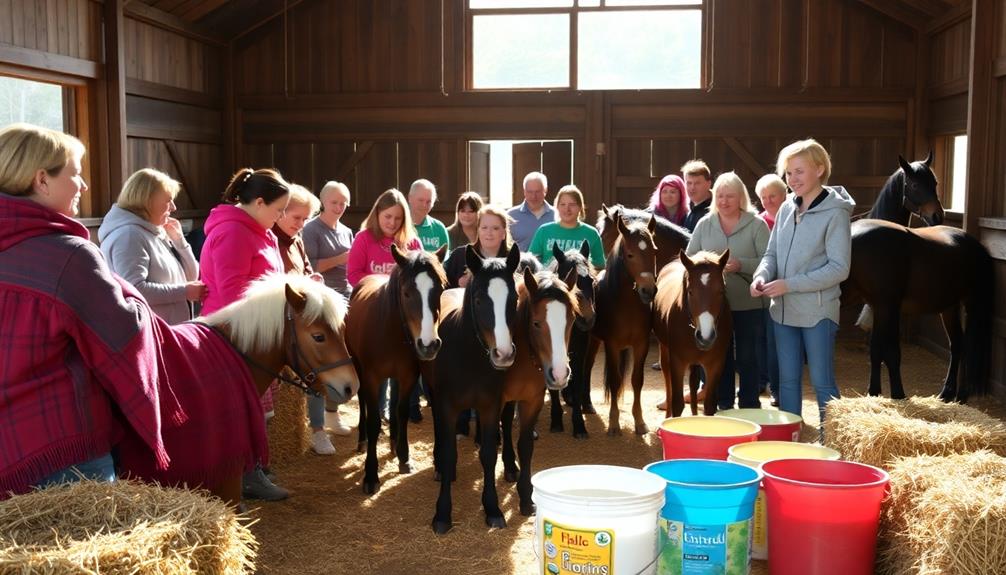
Community engagement plays an essential role in the welfare of miniature horses, fostering a network of support that benefits both the animals and the people involved. By raising community awareness about the needs of these gentle creatures, you can help create a more compassionate environment. Local rescues, like Angels for Minis, rely heavily on your volunteer contributions to thrive.
To support these efforts, consider participating in various community initiatives:
- Organize fundraising events to cover operational costs.
- Volunteer your time for feeding, grooming, or providing medical care.
- Partner with local businesses to promote animal welfare.
- Attend educational programs to spread awareness about miniature horse rescue.
Your involvement can make a significant difference in the lives of these horses. Each act of kindness strengthens community bonds and enhances the overall mission of rehabilitation and care.
When you engage with your local rescue, you not only help the animals but also inspire others to join the cause. Together, we can guarantee that every miniature horse receives the love and support they need to thrive.
Frequently Asked Questions
How Much Do You Have to Weigh to Ride a Mini Horse?
To ride a miniature horse, you should weigh between 30 to 60 pounds. Always consider the horse's size and strength, and consult a veterinarian to verify the horse's health before allowing any riding.
What Is the Life Expectancy of a Miniature Pony?
A miniature pony's life expectancy ranges from 25 to 35 years, but with proper care, some can live into their 40s. Regular vet check-ups and a healthy diet are key to prolonging their life.
How Much Does a Mini Horse Cost per Month?
A mini horse costs you between $200 and $400 a month. This includes feed, veterinary care, hoof maintenance, and insurance. You'll want to budget carefully to guarantee you meet all their needs effectively.
What Are the Disadvantages of Miniature Horses?
"Don't judge a book by its cover." Miniature horses require extensive care, social interaction, and training. Their health issues, space needs, and companionship demands can complicate ownership, making them more challenging than you might think.
Conclusion
In the world of miniature horse rescue, every effort you make is like planting a seed that blossoms into a new life. By supporting these gentle souls, you're not just saving horses; you're transforming lives—both theirs and yours. The journey may have its challenges, but with your dedication and the community's support, you can create lasting change. So, let's continue this mission together and give these minis the second chance they deserve!
